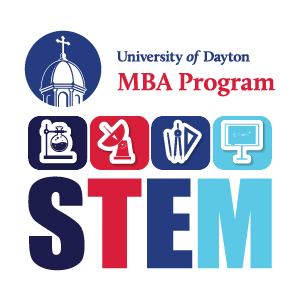School of Business Administration

STEM-Designated MBA
The University of Dayton School of Business has created a path for interested students to receive a STEM-designated MBA! STEM fields (Science, Technology, Engineering, and Mathematics) are generally among the fastest-growing sectors in many parts of the world, particularly in developed countries.
A STEM-designated MBA program combines the traditional business and management curriculum, emphasizing the technical, quantitative, and analytical skills that are increasingly vital in the modern business environment. Students who complete the traditional UD MBA core courses only need two additional STEM-approved electives to qualify for a STEM-designated MBA degree.
"We're thrilled to introduce our STEM-designated MBA program at UD", says Yue Pan, Ph.D. Associate Dean, Graduate Programs and Accreditation. "This program equips students with a unique blend of business and technical skills, putting them on an accelerated path towards achieving their professional and personal goals."
The importance of a STEM-designated MBA can be attributed to several factors:
- Demand for Quantitative Skills: The business world is increasingly driven by data and quantitative analysis. Companies are looking for managers who not only understand the financial and operational aspects of the business but can also interpret complex data and make informed decisions based on that data.
- Technological Advancements: As technology advances, businesses must adapt to stay competitive. A STEM-designated MBA program provides graduates with a better understanding of these technologies and how they can be leveraged for business success.
- Innovation Focus: STEM education encourages a methodical, analytical approach to problem-solving, which is vital for innovation in business. This skill set can be especially valuable in roles that require strategic development and operational efficiency.
- Global Competitiveness: In an increasingly global market, businesses must compete with companies worldwide. A STEM-designated MBA can provide the skills needed to understand and implement the latest best practices and technologies, keeping companies competitive globally.
- Regulatory Benefits for International Students: In the United States, a STEM-designated degree can provide additional benefits for international students. Graduates on an F-1 visa may be eligible for a STEM OPT (Optional Practical Training) extension, allowing them to remain in the country and gain valuable work experience for up to 36 months after graduation, compared to 12 months for non-STEM graduates.
- Interdisciplinary Approach: Businesses today often require a cross-functional understanding across various disciplines. A STEM-designated MBA equips graduates with a broader range of skills that align with the multidisciplinary nature of current business problems and opportunities.
- Enhanced Career Prospects: Graduates from STEM-designated MBA programs often have an edge in the job market, particularly in industries that are science and technology-driven. They are generally well-prepared for roles in finance, consulting, technology, healthcare, and other sectors where analytical and technical skills are in high demand.
- Preparation for Future Trends: As industries such as artificial intelligence, machine learning, and big data continue to grow, having a solid foundation in STEM can be crucial. A STEM-designated MBA ensures that graduates are not just aware of these trends but are also prepared to lead in environments where these technologies play a critical role.
Quinn Evans, an Engineer, is currently taking part in UD's MBA program to get into a more leadership/management role in his company. He says he is "interested in adding the STEM Designation (to his MBA) because roles at my company are more technical management than pure business. I think having a STEM designator on my MBA will show that I have not only learned the business knowledge to be in a leadership role but also that I had a focus on the analytical/technical side of business. Something like this will help me stand out amongst other candidates who've earned an MBA, since I'm in a more technical field."
Overall, a STEM-designated MBA program is seen as a pathway to equipping business leaders with the necessary skills to succeed and excel in a technology-driven, data-intensive business world. It signifies a robust and relevant education that aligns with current and future job market demands.
For more information, contact mba@udayton.edu
